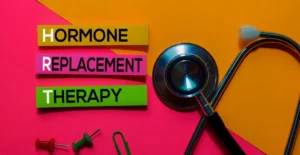Menopause is a natural biological process that marks the end of a woman’s reproductive years. Typically occurring between the ages of 45 and 55, menopause brings about significant hormonal changes, including a decline in estrogen levels. While menopause itself is a normal part of aging, the accompanying symptoms can be challenging for many women. One such symptom that often emerges during this transitional phase is anxiety. In this blog, we will explore the relationship between menopause and anxiety and discuss various treatment options to help women manage and alleviate these symptoms.
Contents
Do Women Going Through Menopause Experience Anxiety?

Yes, many women going through menopause experience anxiety as one of the associated symptoms. Menopause is a natural biological process that marks the end of a woman’s reproductive years, typically occurring in the late 40s to early 50s. During menopause, hormonal fluctuations, particularly a decline in estrogen levels, can have various effects on a woman’s physical and emotional well-being, leading to the emergence of symptoms such as anxiety.
The relationship between menopause and anxiety is complex, and the exact mechanisms are not fully understood. However, hormonal changes play a significant role. Estrogen, a hormone that plays a crucial role in regulating mood, experiences a gradual decline during menopause. This decline can impact neurotransmitters in the brain, such as serotonin, which is associated with mood regulation. As a result, women may experience heightened levels of anxiety, mood swings, irritability, and even depression.
In addition to hormonal changes, other factors can contribute to anxiety during menopause, including:
- Sleep Disturbances: Many women going through menopause experience disruptions in their sleep patterns, such as insomnia or night sweats. Lack of quality sleep can contribute to increased anxiety levels.
- Hot Flashes: The sudden feeling of intense heat, known as hot flashes, is a common symptom of menopause. Hot flashes can be physically uncomfortable and may also contribute to feelings of anxiety.
- Changes in Body Image: The physical changes associated with menopause, such as weight gain and alterations in skin and hair, can impact a woman’s self-esteem and body image, potentially leading to increased anxiety.
- Life Transitions: Menopause represents a significant life transition, often coinciding with other life changes such as children leaving home or retirement. These transitions can contribute to emotional stress and anxiety.
It’s important to note that not all women experience anxiety during menopause, and the severity of symptoms can vary widely among individuals. Some women may navigate this phase with relatively few disruptions, while others may find the emotional and physical changes more challenging to manage.
Common Treatment Methods for Menopause and Anxiety
The treatment of menopausal anxiety involves a holistic approach that addresses both the physical and emotional aspects of this transitional phase in a woman’s life. Here are common treatment methods for menopause and anxiety:
Hormone Replacement Therapy (HRT)

Hormone Replacement Therapy (HRT) has emerged as a viable treatment option for managing anxiety symptoms during menopause, a life stage marked by the cessation of menstruation. Menopause means hormonal fluctuations, particularly a decline in estrogen levels, which can contribute to the onset or exacerbation of anxiety symptoms in some women.
Estrogen, a key hormone in the female reproductive system, plays a crucial role in regulating neurotransmitters and maintaining the balance of various physiological processes, including mood regulation. As women approach menopause, the decline in estrogen levels can lead to disruptions in these systems, potentially triggering anxiety symptoms such as irritability, restlessness, and mood swings.
HRT involves the administration of estrogen, sometimes in combination with progesterone, to alleviate menopausal symptoms. By replenishing hormonal levels, HRT aims to mitigate the impact of hormonal fluctuations on the central nervous system, addressing not only physical symptoms like hot flashes and insomnia but also emotional well-being.
Antidepressant Medications (SSRIs/SNRIs)
Antidepressant medications, specifically Selective Serotonin Reuptake Inhibitors (SSRIs) and Serotonin-Norepinephrine Reuptake Inhibitors (SNRIs), have shown efficacy in the treatment of anxiety symptoms during menopause. Menopausal transitions are often accompanied by hormonal fluctuations, which can contribute to the onset of anxiety disorders or exacerbate pre-existing anxiety conditions.
SSRIs and SNRIs are classes of antidepressants that work by modulating neurotransmitters in the brain, particularly serotonin and norepinephrine. These neurotransmitters play a crucial role in mood regulation, and an imbalance can contribute to anxiety symptoms. By blocking the reuptake of these neurotransmitters, SSRIs, and SNRIs increase their availability in the brain, leading to improved mood and a reduction in anxiety symptoms.
Research has demonstrated the effectiveness of SSRIs and SNRIs in managing anxiety during menopause. These medications not only address the psychological symptoms of anxiety but also provide relief from physical manifestations such as hot flashes and sleep disturbances, commonly experienced during this life stage. Furthermore, antidepressants may offer benefits in cases where anxiety coexists with depressive symptoms.
Cognitive-behavioral therapy (CBT)
Cognitive-behavioral therapy (CBT) has proven to be an effective non-pharmacological intervention for the treatment of anxiety during menopause. Menopausal transitions often bring about hormonal fluctuations, contributing to emotional challenges such as heightened anxiety levels. CBT, a widely utilized therapeutic approach, focuses on identifying and modifying negative thought patterns and behaviors, making it particularly beneficial in addressing anxiety symptoms.
CBT addresses the cognitive aspect of anxiety by helping individuals recognize and reframe irrational thoughts that may contribute to heightened anxiety levels. During menopause, women may experience cognitive distortions related to body image, aging, and perceived loss of reproductive identity. CBT equips individuals with tools to challenge and replace these distorted thoughts with more rational and adaptive ones, fostering a healthier mindset.
The behavioral component of CBT involves implementing strategies to modify patterns of behavior associated with anxiety. Women experiencing menopausal anxiety may exhibit avoidance behaviors or withdrawal from activities that exacerbate their symptoms. CBT encourages the gradual exposure to anxiety-inducing situations and the development of coping mechanisms, empowering individuals to confront and manage their anxiety effectively.
Lifestyle Modifications

Lifestyle modifications play a pivotal role in managing anxiety during menopause, offering women holistic and empowering approaches to enhance their emotional well-being. Menopausal transitions, marked by hormonal fluctuations, can contribute to anxiety symptoms, making lifestyle adjustments a valuable complementary strategy to traditional interventions.
Regular physical activity stands out as a cornerstone of lifestyle modifications for anxiety during menopause. Exercise has been consistently linked to improved mood and reduced anxiety levels. Engaging in activities such as brisk walking, jogging, or yoga not only promotes physical health but also helps regulate stress hormones, contributing to a more stable emotional state.
Dietary changes can also impact anxiety during menopause. Adopting a well-balanced diet that includes sufficient nutrients and antioxidants supports overall health, including mental well-being. Foods rich in omega-3 fatty acids, such as fatty fish and flaxseeds, have been associated with a positive impact on mood and may help alleviate anxiety symptoms.
Adequate sleep is crucial for emotional resilience, and menopausal women often face challenges such as hot flashes and night sweats that can disrupt sleep patterns. Creating a conducive sleep environment, establishing a consistent sleep schedule, and practicing relaxation techniques contribute to better sleep quality, directly influencing anxiety levels.
Herbal Remedies
Herbal remedies have gained popularity as a natural and alternative treatment for anxiety during menopause, offering women a gentler approach to managing symptoms associated with hormonal changes. While scientific research on herbal remedies may vary, some herbs have shown promise in alleviating anxiety and promoting emotional well-being during this transitional phase.
One of the well-known herbal remedies for anxiety is St. John’s Wort (Hypericum perforatum). This herb helps to address mood disorders, including mild to moderate depression and anxiety. St. John’s Wort is believed to influence neurotransmitters in the brain, such as serotonin, which play a key role in mood regulation.
Another herbal option is Valerian (Valeriana officinalis), known for its sedative properties. Valerian root has been used to promote relaxation and improve sleep quality, which can be particularly beneficial for menopausal women experiencing anxiety-related sleep disturbances. While the exact mechanisms are not fully understood, valerian may interact with neurotransmitters involved in the sleep-wake cycle.
Passionflower (Passiflora incarnata) is a traditional herbal remedy with calming effects. It is thought to modulate the activity of neurotransmitters, promoting relaxation and potentially reducing anxiety symptoms. Passionflower is often used in herbal teas or supplements to support emotional well-being.
The adaptogenic herb Ashwagandha (Withania somnifera) has also gained attention for its potential to reduce stress and anxiety. Adaptogens are substances that may help the body adapt to stressors, and Ashwagandha has been studied for its impact on cortisol levels, the hormone associated with stress.
Support Groups and Counseling
Support groups and counseling are invaluable components of the treatment plan for managing anxiety during menopause, offering women opportunities to share experiences, receive emotional support, and explore coping strategies in a structured and empathetic environment.
These support groups provide a sense of community and understanding, allowing women undergoing menopausal transitions to connect with others facing similar challenges. These groups, whether in-person or online, create a platform for sharing personal stories, concerns, and triumphs, fostering a supportive network that combats feelings of isolation. Interacting with peers who are navigating similar experiences can validate emotions and provide valuable insights into coping mechanisms.
Sources To Get Menopause and Anxiety

To obtain reliable information on menopause and anxiety, several reputable online sources are available. These websites provide evidence-based content, expert advice, and support for individuals navigating the challenges of menopausal transitions and anxiety. It’s important to note that the information provided by these sources may be subject to updates, and users should always consult with healthcare professionals for personalized advice. Some reputable online platforms include:
- HerMantra: HerMantra’s website offers comprehensive information on menopause, anxiety, and related topics. The content is authored and reviewed by medical experts, providing reliable and up-to-date information.
- WebMD: WebMD is a health information platform that covers various aspects of menopause and anxiety. The website offers articles, expert perspectives, and community forums for individuals seeking information and support.
- The North American Menopause Society (NAMS): NAMS is a leading organization dedicated to menopause-related education and research. Their website provides evidence-based resources, including articles, videos, and guidelines on menopause and associated symptoms.
- National Institute on Aging (NIA): NIA, part of the National Institutes of Health (NIH), offers information on aging-related topics, including menopause. Their website provides reliable resources for individuals interested in understanding the aging process and associated health concerns.
- Psychology Today: Psychology Today’s website includes articles and insights from mental health professionals on various topics, including anxiety during menopause. The platform aims to provide accessible and informative content for individuals seeking psychological perspectives.
- Women’s Health.gov: Managed by the U.S. Department of Health and Human Services, Women’s Health.gov offers evidence-based information on women’s health issues, including menopause. The website provides resources on managing the physical and emotional aspects of menopausal transitions.
Conclusion
In conclusion, addressing anxiety during menopause requires a holistic approach, considering medical, psychological, and lifestyle factors.
Women should collaborate with healthcare professionals to determine the most suitable interventions. Embracing lifestyle modifications, finding community support, and seeking counseling contribute to a comprehensive approach that empowers women to navigate the emotional complexities of menopausal transitions. Ultimately, a tailored and multifaceted approach enhances well-being, ensuring that women emerge from this life stage with resilience and a positive outlook on their mental health.
If you are facing menopause-related issues, menopause treatment at HerMantra can help. Book your free trial online menopause treatment session now.


